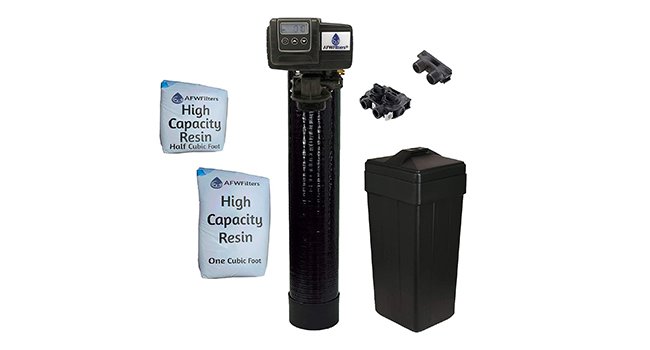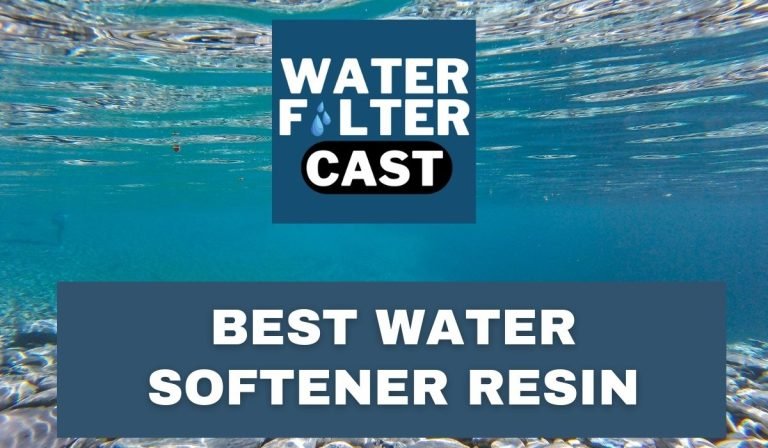Is water softener salt edible? Even if both common salt and water softener salt are similar, water softener salt should never be used for cooking purposes or day-to-day life.

Water softener salts, used in water softener systems, are much similar to the salt that we normally use in our day-to-day cooking since water softener salt is commonly made using Sodium chloride (NaCl), which is similar to common salt. So, this might lead you to have questions such as Is Water Softener Salt Edible?
Water softener salt should not be used for human or animal consumption, even if it is used to soften water. Over-consumption of water softener salt could lead to stomach aches or similar problems. Water softener salt isn’t food-grade salt.
Is Water Softener Salt Poisonous?
Even if water softening salts are not good for human or animal consumption, they are not poisonous to us. The worst it could do is cause you a severe stomachache which could be cured by drinking a few glasses of natural water. Make sure to contact a doctor after drinking the water if this happens.
Water softener salts don’t contain any potentially poisonous compounds and so it obviously can’t be poisonous, though they do contain dirt since they aren’t really cleaned properly. So basically no, water softener salts are not poisonous.
Is Water Softener Salt Safe To Eat?

Like I said before, water softener salts are not poisonous, which means that they wouldn’t cause any huge problems if consumed. But it isn’t recommended to eat water softener salts since they contain a lot of dirt and are not cleaned or processed properly. If you check your water softener, you would be able to find dirt left on the filter which was mostly from the water softener salts.
Even if eating water softener salt isn’t recommended, it is still safe if you accidentally consumed them. Just drink some water so that the concentration of the salt can be reduced and the salt pellet or crystal will melt.
While, some people may think otherwise, but there is nothing wrong with eating water softener salt. It does have an effect on your body when consumed over time, however, it won’t kill you. If you accidentally consume too many water softener salts, then yes, you will experience nausea and diarrhea. But these symptoms usually go away within 24 hours.
Don’t be overly concerned if you accidentally consumed a little amount of water softener salt. If you have had more than 1oz I would recommend calling the poison control hotline for further advice.
Can You Use Softener Salt With Food, Such As Canning Or With Meat Packing?
Even if water softener salt is used for softening water and doesn’t cause major issues even if consumed, it should not be used for any canning or packing food or meat. These salts come in salt pellets or crystals and can also contain much dirt within them since they are not properly processed, so using them for canning or packing would only cause dirt to mix up with your food. And the salt will also take a long time to melt in. It’s best to use table salt or canning salt for canning or packing food and avoid using softening salt. You wouldn’t want dirt in your canned or packaged food, do you?
Plus, there might be other chemicals added to these types of salt such as anti-caking agents, stabilizers, etc., which may affect how foods taste when cooked. So no, you should not use water softener salt for canning or meatpacking, and make sure to read all labels carefully first!
Is Water Softener Salt The Same As Regular Table Salt?
Regular table salt used in day-to-day cooking is made of only sodium chloride minerals and iodine and doesn’t contain any other compounds within it. However, water softener salts contain unprocessed sodium chloride, potassium chloride, and many dirt particles since they are not properly cleaned. These dirt particles however get filtered inside the water softener so you don’t need to have to fear that. Water softener salts are sometimes made of calcium chloride as well.
Regular table salt with iodine is mostly used to add other essential minerals to salt, which probably can’t be found in any water softener salts since they are made to help remove minerals from water. So water softener salts and common table salts are not the same.
Other types of salt used in water softening like solar salt, rock salt, and brine blocks are not recommended for food application for the same reasons.
Can water softener salts make you sick?

For normal healthy people, water from water softeners can’t really make you sick since water softener salts only add a little amount of salt(sodium) to water. So little is added to softened water, that it’s hardly noticed when you drink it.
But for people who are advised to control their intake of salt or sodium, using water softener salts wouldn’t be recommended since the sodium content in softened water is higher than in normal water leading to an increase in sodium content in your body. Stick to using normal water if this is the case.
Finally, if you’re allergic to regular table salt, then don’t worry about consuming water softener salt either because most brands of water softener salt contain less amount of sodium compared to regular table salt.
Can I Use Water Softening Salt in My Ice Cream Freezer?

Salt has the ability to reduce the freezing point of water making it harder for ice to melt. By adding softening salt to ice cream freezers or regular freezers, you can conserve energy used to keep the freezer cool. So yes, softening salt can be used in ice cream freezers. Rock and solar salts work much better in this case than softening salt does.
You can even use softening salt to make ice cream so that it’ll stay sometime before melting. Additionally, there are special types of salt called “ice-cream salt” that contains magnesium sulfate instead of sodium chloride. This kind of salt helps prevent the crystallization of sugar during storage. But these kinds of salt aren’t suitable for home use because they’re expensive.
Wrapping Up
In conclusion, eating water softening salt isn’t harmful or poisonous even if they are not edible. They contain chemicals other than sodium chloride, avoid using it in food or for canning and packing. They can still be used in water or ice cream freezers and even in ice cream since they can reduce the freezing point of water thus reducing the chance of it melting.
Be cautious while using softening salts and always make sure to read the manufacturer’s guide whenever you use it.
Frequently Asked Questions
Here are answers to some frequently asked questions related to water softening salt
Is Water softener salt the same as regular rock salt?
Sidewalk salt, also known as rock salt, is sodium chloride that is unprocessed or cleaned. It is salt directly taken from the ground. Even if both salt types are alike, water softener salt can’t melt ice any faster than rock salt could, and it is not recommended to use rock salt in water softeners. This could cause major issues.
Is it OK to drink water from a water softener?
Water from water softeners is recommended to drink in major cases, but the salt doesn’t usually get into the water supply and is only used to soften the resin that acts on water. However, softened water will probably contain more sodium than usual. Sodium and common salt (sodium chloride) are different.
What other uses does water softener salts have?
Other than softening water, water softener salts can be used to melt snow or ice, which might probably be blocking your walkway or driveway. It could also be used to eliminate weeds or unwanted grass from your garden, water softener salts remove minerals from the weeds and grass. You can even use it to make ice cream!
Can I use water softener salt in my bath?
Using water softener salts in baths is not bad; just make sure that you use a softener salt that is recommended for bath usage. Some water softeners can be used in baths while some can’t be used. Water softener salt manufacturer’s directions contain what the salt can be used for, so read it before usage. Softener salts like solar salt can be used in baths.
Will softened water kill grass?
Since water softener salts are made to help remove minerals in salt and soften hard waters, they can’t really kill the grass. But it isn’t good practice to always water your gardens with softened water because your plants will then not get the required minerals from water. Furthermore, using too much salt may damage your lawn by killing off its roots. So don’t overdo it when watering your lawn.




![Best Salt-Free Water Softeners - [Reviews - 2023 Edition] 9 Best salt free water softener](https://waterfiltercast.com/wp-content/uploads/2020/09/Best-salt-free-water-softener.jpg)
